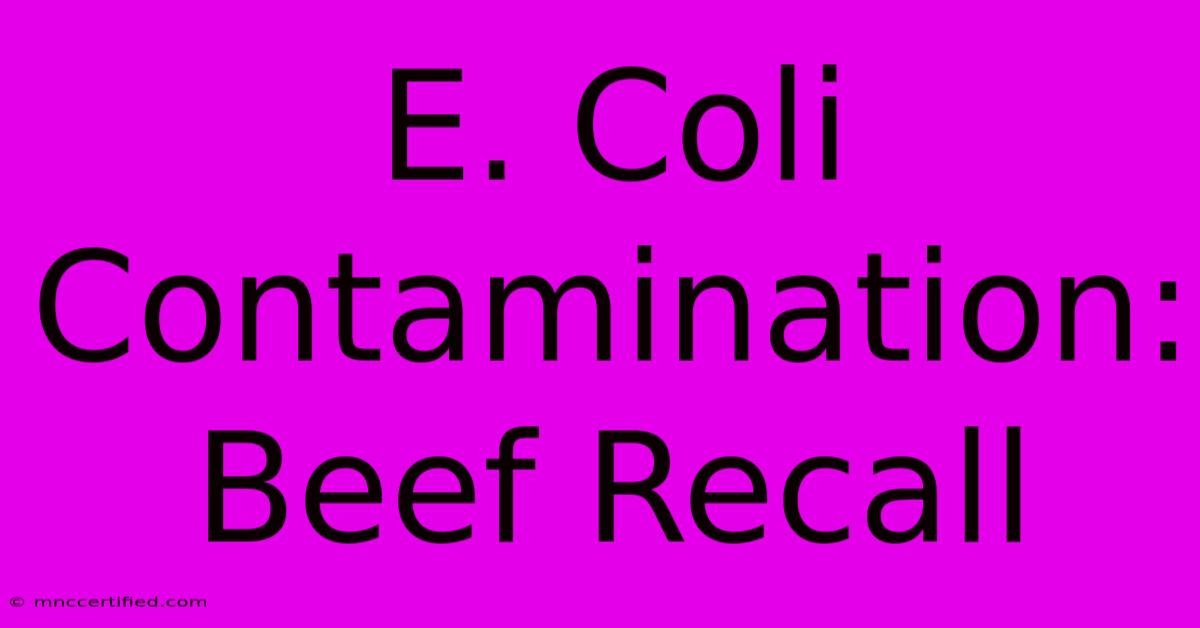E. Coli Contamination: Beef Recall

Table of Contents
E. coli Contamination: Understanding Beef Recalls and Protecting Yourself
E. coli contamination in beef is a serious public health concern. Understanding the risks, the causes, and how to protect yourself is crucial. This article will delve into the complexities of E. coli outbreaks linked to beef recalls, providing you with the knowledge to make informed choices and safeguard your family's health.
What is E. coli and Why is Beef a Concern?
Escherichia coli (E. coli) is a bacteria commonly found in the intestines of humans and animals. While most strains are harmless, some, like E. coli O157:H7, are pathogenic, producing toxins that cause severe illness. Beef can become contaminated at various points in the production chain, from the farm to the supermarket. This contamination can occur through fecal matter, contaminated water, or cross-contamination during processing.
Symptoms of E. coli Infection
Symptoms of E. coli infection typically appear within 2-10 days after consuming contaminated food and can range from mild to severe. These include:
- Diarrhea (often bloody): This is a key indicator of E. coli infection.
- Stomach cramps: Intense abdominal pain is common.
- Vomiting: While not always present, vomiting can be a significant symptom.
- Fever: A fever might be present, but it's not always a prominent symptom.
- Hemolytic Uremic Syndrome (HUS): In severe cases, E. coli infection can lead to HUS, a life-threatening complication affecting the kidneys. This is particularly concerning for young children and the elderly.
If you suspect an E. coli infection, seek immediate medical attention. Early diagnosis and treatment are crucial to prevent serious complications.
How Beef Recalls Happen and What to Do
When E. coli contamination is detected in beef products, a recall is issued by the relevant food safety authorities (such as the USDA in the US or the FDA). These recalls are initiated after investigations link illnesses to specific batches of beef.
Steps to Take During a Beef Recall:
- Check Recall Notices: Regularly check the websites of your national food safety agencies for recall announcements. Sign up for email alerts if possible.
- Identify Affected Products: Carefully examine the recall notice for details like brand names, product codes, and "use-by" dates.
- Discard Contaminated Beef: Immediately discard any beef products matching the description in the recall notice. Do not consume it, even if it appears perfectly fine.
- Clean Your Refrigerator: Thoroughly clean your refrigerator, especially areas where the recalled beef was stored, to prevent cross-contamination.
- Report Illnesses: If you or someone you know experiences symptoms after consuming potentially contaminated beef, report it to your healthcare provider and the relevant food safety authorities.
Preventing E. coli Contamination at Home
While beef recalls highlight systemic issues, taking precautions at home is vital in preventing E. coli infection.
Safe Handling Practices:
- Wash Your Hands: Wash your hands thoroughly with soap and water before and after handling raw beef.
- Separate Raw Beef: Keep raw beef separate from other foods to avoid cross-contamination. Use separate cutting boards and utensils.
- Cook Thoroughly: Ensure beef is cooked to an internal temperature of at least 160°F (71°C) to kill harmful bacteria. Use a food thermometer to check the temperature.
- Refrigerate Properly: Store raw beef at a safe temperature (below 40°F or 4°C).
The Bigger Picture: Reducing E. coli Risks
The issue of E. coli contamination in beef extends beyond individual consumer responsibility. Improvements across the entire beef production chain are essential, from farm practices to processing and distribution. Stronger regulations, improved sanitation measures, and enhanced traceability systems are all critical to minimizing the risk of future outbreaks.
This article provides a comprehensive overview of E. coli contamination in beef and the associated recalls. Remember, being informed and practicing safe food handling habits are crucial steps in protecting yourself and your loved ones from this serious health risk. Always stay updated on recall information from official sources.

Thank you for visiting our website wich cover about E. Coli Contamination: Beef Recall. We hope the information provided has been useful to you. Feel free to contact us if you have any questions or need further assistance. See you next time and dont miss to bookmark.
Featured Posts
-
Pamela Haydens Best Milhouse Moments
Nov 22, 2024
-
Russia Deploys Irbm In Ukraine
Nov 22, 2024
-
State Overturns Smolletts Conviction
Nov 22, 2024
-
Pierss Reaction To Ellens Departure
Nov 22, 2024
-
Vendor Insurance For Craft Shows
Nov 22, 2024